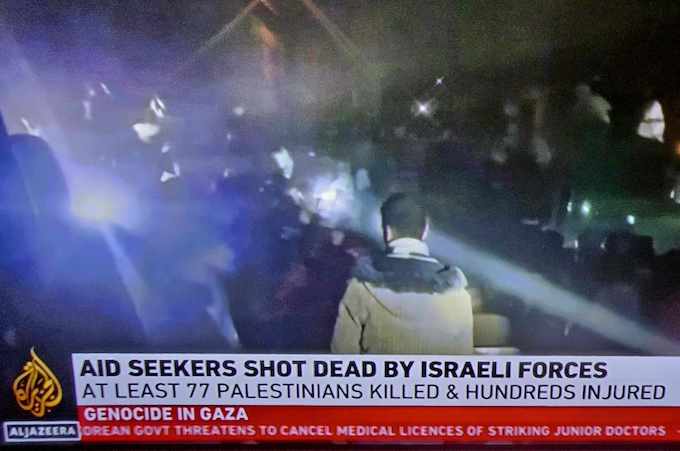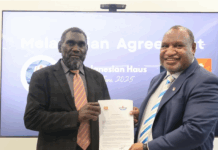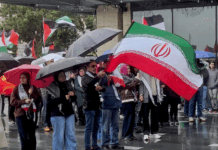
ANALYSIS: By Alexander Gillespie, University of Waikato
Despite the carnage, United Nations resolutions and international court rulings, Israel’s war in Gaza has the potential to get much worse. Unless Hamas frees all Israeli hostages by March 10, Israel may launch an all-out offensive in Rafah, a city of 1.5 million people, cornered against the border with Egypt.
The US has continued to block UN Security Council resolutions calling for an immediate ceasefire. But President Joe Biden has cautioned Israel against a Rafah ground assault without a credible plan to protect civilians.
More direct calls for restraint have come from the UN secretary-general and the prosecutor of the International Criminal Court.
- READ MORE: Israeli siege has placed Gazans at risk of starvation − prewar policies made them vulnerable in the first place
- Why Egypt refuses to open its border to Palestinians forcibly displaced from Gaza
- The UN’s top court didn’t call for a ceasefire in Gaza – how does NZ respond now?
To its credit, New Zealand, along with Australia and Canada, added its voice in a joint statement on February 15:
A military operation into Rafah would be catastrophic […] We urge the Israeli government not to go down this path […] Palestinian civilians cannot be made to pay the price of defeating Hamas.
New Zealand also reiterated its commitment to a political settlement and a two-state solution. Given how hard some other countries are pushing for a ceasefire and peace, however, it is fair to ask whether the National-led coalition government could be doing more.
NZ absent from a crucial case
So far, New Zealand’s most obvious contribution has been to deploy a six-member defence force team to the region to deter Houthi rebel attacks on commercial and naval shipping in the Red Sea.
This collaboration with 13 other countries is on the right side of international law. But the timing suggests it is more about preventing the Israel-Gaza situation from spreading and destabilising the region than about protecting international waterways per se.
Furthermore, there is a risk of New Zealand’s response appearing one-sided, considering its relative silence on other fronts.
For example, following the interim ruling by the International Court of Justice (ICJ) on the application of the Genocide Convention to Israel’s devastation of Gaza, a second opinion is being sought from the court over the legality of Israel’s occupation of Palestinian territory.
Palestinian Foreign Minister Riyad Al-Malki told the court his people were suffering “colonialism and apartheid” under Israeli occupation. It was the latest round in a monumental debate central to any lasting peace process.
More than 50 countries presented arguments at the ICJ last week, the most to engage with any single case since the court was established in 1945. But New Zealand was not present in the oral proceedings.
This absence matches New Zealand’s abstention at the United Nations General Assembly vote that referred the case to the ICJ. A country that prides itself on an independent foreign policy seems to have lost its voice.
Doctors Without Borders warns that Gaza’s whole healthcare system is collapsing as Israel continues to intensify its attacks.
🔴 Follow our LIVE coverage: https://t.co/bo5Dp2wxPd pic.twitter.com/lyy6NQiRhX
— Al Jazeera English (@AJEnglish) February 29, 2024
An even-handed foreign policy
New Zealand does call for the observance of international humanitarian law in Gaza. It has been less vocal, though, about calling for accountability for war crimes, no matter which side commits them.
The International Criminal Court, New Zealand’s permanent representative to the UN has said, is “a central pillar in the international rules-based order and the international criminal justice system”.
Directly supporting that sentiment would mean calling for independent investigations of all alleged crimes in the current Israel-Gaza conflict.
Given countries it considers friends and allies do more to register their disapproval of the situation, New Zealand needs to consider whether its own current sanctions system is adequate.
The White House has begun to sanction individual Israeli settlers in the occupied Palestinian territories, accusing them of undermining peace, security and stability. Britain has also placed sanctions on a small number of “extremist” settlers. France has recently identified and sanctioned 28 such individuals.
Govt designates Hamas as terrorist entity https://t.co/b2EQyehohr
— Newshub Politics (@NewshubPolitics) February 29, 2024
However, New Zealand has remained silent, until this week declaring the political wing of Hamas a “terrorist” entity — a decision being criticised — and banning an unspecified number of extremist Israeli settlers from travelling to New Zealand.
This prompts an obvious question: if sanctions can be applied to both Russia and Iran for their actions, should New Zealand now follow the lead of its allies and take active measures to express its disapproval of what is happening in Gaza and the occupied territories?![]()
Dr Alexander Gillespie is professor of Law at the University of Waikato. This article is republished from The Conversation under a Creative Commons licence. Read the original article.











































